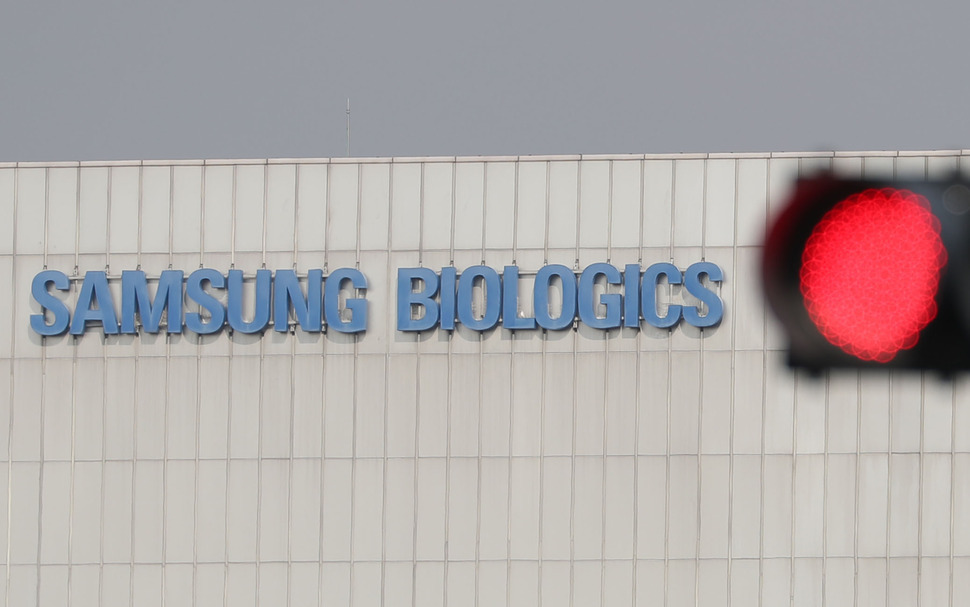 |
|
An image of the Samsung BioLogics building in Incheon. A red light symbolically flashes next to the company, which under fire for accounting fraud.
|
Financial misconduct at Samsung expected to have serious ramifications for Lee’s trial
South Korean regulators’ findings that Samsung BioLogics engaged in “deliberate accounting fraud” is expected to have serious ramifications for the trial of Samsung Electronics Vice Chairman Lee Jae-yong and the overall management structure in the Samsung Group. Since this means that books were cooked to aid Lee’s succession of control of the group, it further deflates consumer confidence in the group, which had already been battered by the Choi Soon-sil influence-peddling scandal. For now, this is sure to have a major impact on Lee’s trial, which is currently pending at the Supreme Court. This past February, a high court only gave Lee a suspended sentence after finding that the Samsung C&T merger was not the center of an effort to aid Lee’s succession to control of the group. But the results of this investigation have demonstrated that the fraudulent accounting at Samsung BioLogics was masterminded by the Samsung Group’s Future Strategy Office (FSO) to aid Lee’s succession. During the course of their investigation, South Korea’s financial regulators acquired a large amount of evidence. This includes documents indicating that Samsung BioLogics’ financial team and the Samsung Group’s FSO worked together during the 2015 merger of Samsung C&T and Cheil Industries to ensure the merger worked in Lee’s favor. Regulators also confirmed that, after Bioepis’ value was inflated to bulk up Cheil Industries, the books were then doctored to avoid the side effect of complete capital impairment at Samsung BioLogics. In short, Lee’s succession of management control of the group was the beginning and end of accounting fraud at Samsung BioLogics. “Even though a trial at the Supreme Court is supposed to focus on legal matters, the court is unlikely to disregard important evidence that turns up. The big question is what the Supreme Court decides to do with the new evidence found by the financial regulators,” said an attorney who formerly served as a senior prosecutor. Now that the financial regulators have submitted a complaint about the accounting fraud, Lee is effectively being investigated again, in addition to his ongoing trial. After receiving a suspended sentence early this year, Lee kept a low profile until the second half of the year, when he resumed his public activities, including a meeting with South Korean President Moon Jae-in and a visit to North Korea. But if he receives another summons by the prosecutors, this time over the fraudulent accounting at Samsung BioLogics, he’ll probably have to put his public activity on hold once again. The prosecutors already assigned the Samsung BioLogics case to the second special investigations division at the Seoul Central District Prosecutors’ Office after complaints were filed by People’s Solidarity for Participatory Democracy and other groups this past July. At that time, Lee was not included among the accused, but additional complaints were filed at the beginning of this month. Considering that Lee was the greatest beneficiary of the Samsung C&T merger and that, as the effective owner of the Samsung Group, he oversaw the activities of the FSO and Samsung C&T, this investigation is ultimately expected to center on the question of whether Lee was the one who ordered the accounting fraud. It’s also possible that investigators could end up looking into charges of breach of trust or stock price manipulation by Lee or other members of the owning family. Reorganization of Samsung’s power structure in jeopardy The reorganization of the control structure at the Samsung Group is also in danger. Currently, control of the group consists of a chain running from Lee Jae-yong to Samsung C&T, Samsung Life Insurance and Samsung Electronics. In line with its support for keeping banking and commerce separate, the ruling party is pushing for a revision to the Insurance Business Act that would require the 3% limit on insurers’ affiliate stock holdings to be calculated according to the stock’s current value rather than its value at the time of acquisition. If this revision passes, Samsung Life Insurance would have to sell more than 20 trillion won (US$17.7 billion) worth of stock in Samsung Electronics. While market observers have posited several scenarios, the most likely approach would be for Samsung C&T to use its 43.44% share in Samsung BioLogics to acquire Samsung Life Insurance’s share in Samsung Electronics. But since the Securities and Futures Commission’s decision contained grounds for reviewing whether Samsung BioLogics’ stock should be delisted from the exchange, trading of the company’s shares has been suspended, which could damage their value. If stock prices do not rebound, Samsung’s preferred option becomes nearly impossible to implement. Will financial regulators launch an audit of Samsung C&T? Another big question is whether financial regulators will launch an audit of Samsung C&T, which functions as a holding company for the group. “The decision of the Securities and Futures Commission requires the revision of the financial statements of Samsung BioLogics as well as of Samsung C&T, its parent company. We’ll carry out a thorough analysis to review the necessity of auditing Samsung C&T,” said Kim Yong-beom, the vice chair of the Financial Services Commission. And on Nov. 7, Choi Jong-ku, head of the Financial Services Commission, said an argument could be made for auditing Samsung C&T. That could put the possibility of fraudulent accounting at Samsung C&T, in addition to Samsung BioLogics, under the microscope, along with the appropriateness of the merger itself. By Choi Hyun-june and Kim Nam-il, staff reporters Please direct comments or questions to [english@hani.co.kr]





